Central African Republic
A Human Rights Watch report released on Wednesday says that armed groups in the Central African Republic have killed civilians with wholesale impunity, spurring more violence in the country.
The rights group says that the 92-page report presents a comprehensive account of war crimes committed in three central provinces since late 2014, including more than 560 civilian deaths and the destruction of more than 4,200 homes.
Not a single fighter or Commander has been detained, arrested or otherwise held to account, according to the report.
This report coincides with the opening of The Special Criminal Court (SCC) in Bangui, a new judicial body that will investigate and prosecute human rights violations and war crimes in the country since 2003. It’s operations are set to begin in October 2017.
In #CARcrisis “you can kill without consequence.” New court can help bring justice,
— Lewis Mudge (LewisMudge) July 5, 2017hrwreport says. https://t.co/kMW7HIXWJc pic.twitter.com/iVWO7d6aus
Human Rights Watch interviewed hundreds of people for the report, including victims, relatives of victims, witnesses to attacks, and officials of the government, the United Nations, humanitarian organizations, and others. Report appendices detail nearly 120 attacks in Nana-Grébizi, Ouham, and Ouaka provinces since late 2014.The full number is no doubt higher, it says.
On May 30, 2017, the UN peacekeeping mission in the country, MINUSCA, and the Office of the United Nations High Commissioner for Human Rights released a large report on serious violations of human rights and international humanitarian law committed in the Central African Republic since January 1, 2003, but it covers crimes committed only until 2015.
Fighting Tactics
Killing civilians and razing villages have been at the heart of fighting tactics by the mostly Muslim Seleka and opposing Christian and animist anti-balaka groups, Human Rights Watch found.
Countrywide, armed groups have forced tens of thousands of people from their homes and into the bush, where hundreds died of exposure, disease, or hunger. People with disabilities were especially at-risk because they could not flee quickly and faced barriers to access sanitation, food, and medical care in displacement camps.
In one case from the report, fighters from a Seleka faction called the Union for Peace in the Central African Republic (l’Union pour la Paix en Centrafrique, UPC), attacked the town of Yassin, in Ouaka province, on March 20, 2017, and killed at least 18 civilians. One man described how he lost his mother and four children, ages 13, 10, 3 and 7 months. “My wife later told me the kids were playing [outside a hut] with the baby when the attack started,” he said. “We found them there, dead on the mat. They had all been shot.”
#CARcrisis: justice urgently needed to stop ongoing atrocities. Int'l community should support. New
— Claudio Francavilla (ClaFrancavilla) July 5, 2017hrwreport: https://t.co/zqYNhRLSYe pic.twitter.com/vJpLcVWZlE
Violence has increased in recent months in the Haute Kotto and Ouaka provinces as competing factions of Seleka and anti-balaka groups fight for control of territory and rich natural resources.
The United Nations peacekeeping mission has at times struggled to maintain security, especially in the central provinces. In recent months, some armed groups have attacked MINSUCA peacekeepers, and in May six were killed.
The government and 13 of the 14 armed groups active in the country signed a peace deal on June 19 that includes a ceasefire and political representation for armed groups, and rightly acknowledges the work of the ICC and SCC. The next day, fighting in the town of Bria between anti-balaka fighters and another Seleka faction, the Popular Front for the Renaissance in the Central African Republic (Front Populaire pour la Renaissance de la Centrafrique, FPRC), left up to 100 people dead, Reuters reported.
The crimes Human Rights Watch documented fall within the jurisdiction of the ICC, which has two investigations in the country. But the ICC only has capacity to target those most responsible for serious crimes. Scores of other commanders who bear criminal responsibility for atrocities, some of whom Human Rights Watch identified by name, may never face justice.
To close this gap, in June 2015 the government established the SCC. If properly resourced and supported, the court could help serve justice in the Central African Republic and set a precedent for other countries, Human Rights Watch said.
SCC Challenges
Progress in setting up the SCC has been slow, but the government has appointed some key posts in the past five months, including for the chief prosecutor and several judges. Human Rights Watch recommended that President Faustin-Archange Touadéra designate a point person in his cabinet to coordinate work with the SCC, while respecting the court’s judicial independence.
The SCC faces steep challenges given continued insecurity in the country and the weak state of the country’s justice system. The UN mission and supportive governments should help create robust systems to protect witnesses and victims, and to provide security for court personnel, as well as assistance in conducting effective investigations. To bolster the domestic justice system, training and other support for court staff should be open to other justice sector practitioners whenever possible, Human Rights Watch said.
The SCC also needs more funding to operate effectively. Partner governments have pledged only US$5.2 million for the first 14 months of the court’s five-year renewable mandate. Donors and the UN should support the court so it can complete its work.
The Central African Republic swung into civil war in 2013 following the overthrow of President Francois Bozizé by ex-Seleka, leading to a counter-offensive by the anti-Balaka militias.




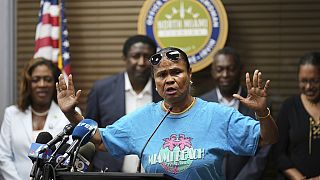

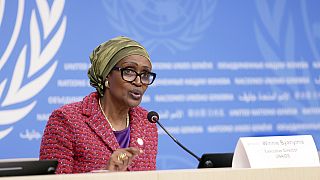
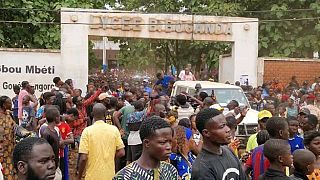
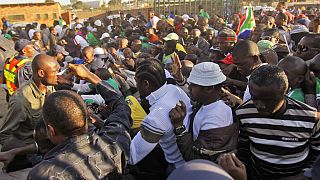
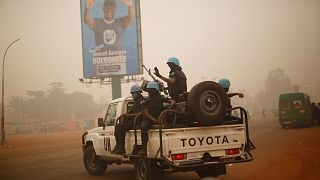


01:11
Sudan: U.S. sanctions over alleged chemical weapons use come into force
01:47
'Minerals': Researcher explains U.S. interest in DRC-Rwanda truce
01:51
South Sudan launches military court to enforce accountability and justice
Go to video
UN warns of escalating humanitarian catastrophe in Sudan amid ongoing conflict
01:52
Why Juneteenth matters: the day slavery truly ended in the U.S.
01:19
Record number: nearly 1.3 million Haitians now internally displaced